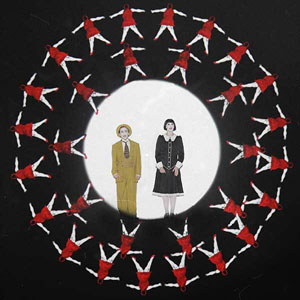
 Highly Recommended ***** Theatre is a visual medium: this production of The Magic Flute is quite decisive about that. Originally conceived of by Komische Oper Berlin’s artistic director Barrie Kosky and London-based theatre company 1927 co-director Suzanne Andrade, the new-to-Chicago production at the Lyric is a smorgasbord of creepy silent film/stop motion animation era visuals. Not that they don’t fit Wolfgang Amadeus Mozart’s strange, fever dream singspiel, which glides episodically between fantastic scenes of menace accompanied by ethereal music. But when the show opens with a projection of a dragon that puts Fafner to shame and they only get wilder from there, there’s no doubt this is an opera that can only be seen.
Highly Recommended ***** Theatre is a visual medium: this production of The Magic Flute is quite decisive about that. Originally conceived of by Komische Oper Berlin’s artistic director Barrie Kosky and London-based theatre company 1927 co-director Suzanne Andrade, the new-to-Chicago production at the Lyric is a smorgasbord of creepy silent film/stop motion animation era visuals. Not that they don’t fit Wolfgang Amadeus Mozart’s strange, fever dream singspiel, which glides episodically between fantastic scenes of menace accompanied by ethereal music. But when the show opens with a projection of a dragon that puts Fafner to shame and they only get wilder from there, there’s no doubt this is an opera that can only be seen.
The Magic Flute’s story concerns a human (?) prince, Tamino (Pavel Petrov), who has become lost deep in the woods. He is aided by the magical Queen of the Night (Lila Dufy) and her bird catcher, Papageno (Huw Montague Rendall), and tasked with retrieving her daughter, Pamina (Ying Fang) from the temple of the mysterious sorcerer Sarastro (Tareq Nazmi). But although Pamina is tormented by Sarastro’s servant, Monostatos (Brentan Ryan), Sarastro claims ignorance of this and insists he has only acted benevolently. He tells Tamino and Pamina they will be allowed to marry, and that Papageno will be awarded a wife of his own, if they can pass trials of silence, self-denial, and physical peril.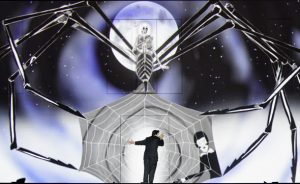
Crucial to this production’s mood and outlook is that it doesn’t push the viewer to accept Sarastro as a moral authority. Sometimes he appears in projected form as a shadowy mechanical colossus, at others as a Masonic Abraham Lincoln bellowing misogyny down from his alcove. He seems the Queen of the Night’s equal counterpart and his “comforting” of Pamina by having his cultists swarm over her is just as hair-raising as the Queen’s famous aria, “Der hölle rache.” (Dufy’s delivery is stupendous and oddly convincing as having come from her animated form.) The production also centers Papageno, who is understandably unhappy with being subjected to the whims of both these capricious authorities even if he’s a native of this Weimar Wonderland, and whose own foibles appear much more forgivable given the stress he’s under. True to his Silent Era clown forebearers, being endlessly put-upon is also what makes him hilarious. 1927 co-artistic director and animation designer Paul Barritt empowers the Queen’s ladies-in-waiting (Mathilda Edge, Katherine DeYoung, and Kathleen Felty) with endlessly creative ways to torment him to the audience’s delight.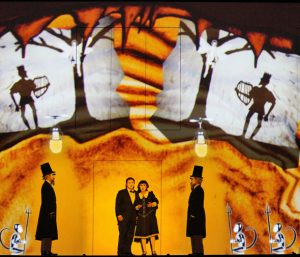
Kosky stressed that the design of this production, spearheaded by Strindbergian symbolist veteran Esther Bialas, is built around the actors, and meant to aid them rather than mask or distract from then. A program note states that the speed of the animations is responsive to the tempo set by conductor Karen Kamensek, a Chicago native making her Lyric debut, and it’s easy to lose track of time in Mozart’s musical labyrinth. Certainly, the singing actors demonstrate plenty of character even while playing such alien figures; Ryan is especially memorable as an unusually chipper Count Orlok lookalike, and Fang’s Pamina is as graceful as any illusion made of light. The production has also eliminated the lengthy spouts of dialogue, replacing them with title cards. The result is an experience that flows much more smoothly than other versions and feels more informed by intuition.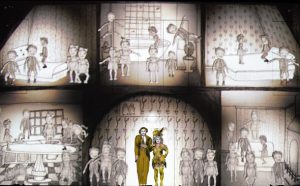
The Magic Flute will continue at the Lyric Opera House, 20 N Upper Wacker Drive, Chicago, thru November 27, with the following showtimes: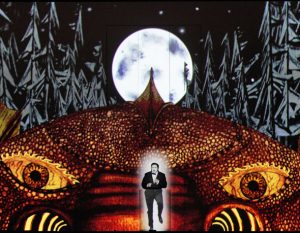
November 14 2:00 pm
November 17 2:00 pm
November 19 7:00 pm
November 27 7:30 pm
Running time is two hours and forty minutes with one intermission.
Performances are in German with English supertitles.
The Lyric offers parking deals with Poetry Garage at 201 W Madison St. if inquired about in advance. Tickets start at $39; to order, visit LyricOpera.org or call 321-827-5600.
To see what others are saying, visit www.theatreinchicago.com, go to Review Round-Up and click at “The Magic Flute.”





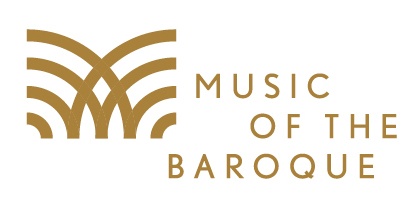
More Stories
“Brooklyn Laundry”
“Guys & Dolls”
“The Music Man”